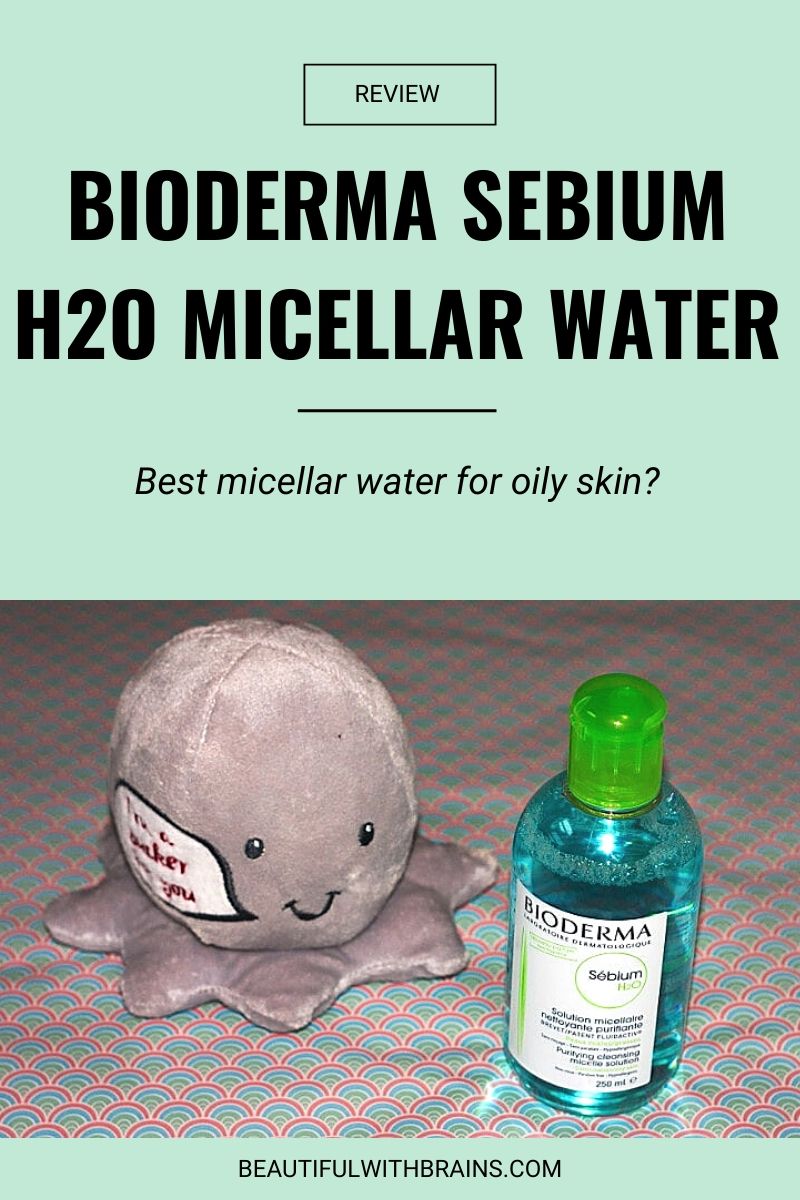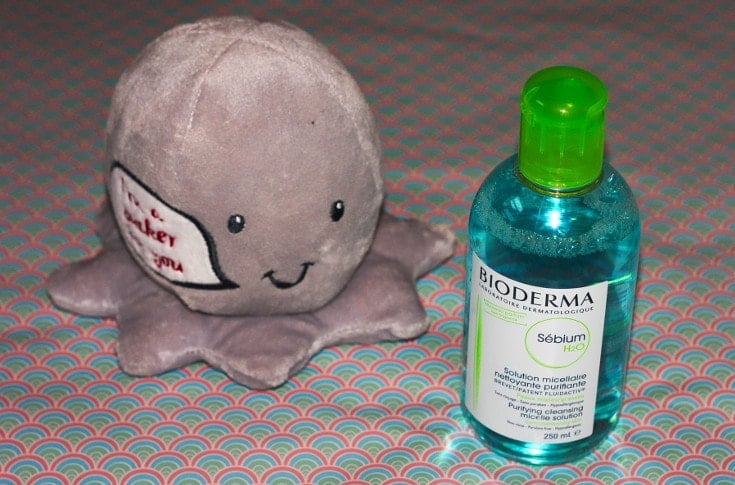
What, you thought the only micellar water Bioderma makes is Sensibio? Nope, they also make Hydrabio for dry skin and Bioderma Sebium H2O Micellar Water for oily skin. And, surpringly, they aren’t all identical. Bioderma didn’t put the same formula in different bottles and just changed the labels, like most brands do. Sure, there are lots of similarities between them, but there are also some small differences that make each one more suitable for a different skin type and need. Sebium, for example, is perfect for skin types that produce a little too much extra oil. Here’s why and everything you need to know about it:
- Key Ingredients In Bioderma Sebium H2O Micellar Water: What Makes It Work?
- The Rest Of The Formula & Ingredients
- Texture
- Fragrance
- How To Use It
- Packaging
- Performance & Personal Opinion
- How Does Bioderma Sebium H2O Compare To Bioderma Sensibio H2O and Bioderma Hydrabio H2O and Pigmentbio H2O Micellar Waters?
- What I Like About Bioderma Sebium H2O Micellar Water
- What I DON’T Like About Bioderma Sebium H2O Micellar Water
- Who Should Use This?
- Does Bioderma Sebium H2O Micellar Water Live Up To Its Claims?
- Price & Availability
- The Verdict: Should You Buy It?
- Dupes & Alternatives
Key Ingredients In Bioderma Sebium H2O Micellar Water: What Makes It Work?
PEG-6 CAPRYLIC/CAPRIC GLYCERIDES TO CLEANSE SKIN
Micellar cleansing waters are basically soapy water. They are made up mostly of water (obviously!) and one or more surfactants. In the case of Bioderma Sebium H2O Micellar Lotion, this is PEG-6 Caprylic/Capric Glycerides. It’s a mixture of mono-, di-, and tri- glycerides of caprylic and capric acids mixed with ethylene glycol used to carry oils into water-based systems.
Here’s how it works. Surfactants have two ends (or a head and a tail). The head is hydroliphic (attracts water and repels oils), while the end is lipoliphic (attracts oils and repels water). Oils and waters, like you probably know if you’ve tried to wash a greasy plate with water alone, don’t mix.
When enough surfactant is added to water, its molecules assemble into little groups called micelles. Their arrangement, though, isn’t random. The hydroliphic, water-loving heads are pointed outwards, towards the water, while the lipoliphic, water-hating tails face inwards, well away from it.
Enter cotton. Like the surfactants’ heads, cotton loves water too. So, when micellar water is poured onto cotton, the water-loving heads are instantly attracted to it. They firmly stick to the cotton, while the oil-loving tails are now pointing outwards, towards your face.When you massage the cotton onto your face, the tails are able to dissolve the oils in your makeup and the excess sebum on your skin.
Need help creating the best skincare routine for you oily skin? Sign up to the newsletter below to receive the “Oily Skincare Routine Cheatsheet” (it includes product recommendations, too!).
ZINC GLUCONATE TO REGULATE OIL PRODUCTION
You’ve probably heard about Zinc Gluconate as an oral supplement that can kick acne in the butt. But does it work when topically applied to the skin, too? We don’t know, yet. But zinc itself has a couple of anti-acne superpowers:
- Oil regulation: It reduces the production of hormones responsible for excessive oil production.
- Soothing: It has anti-inflammatory properties that reduce inflammation and help treat acne, eczema, rosacea, psoriasis and other inflammatory skin conditions.
Let’s put this way: research hasn’t showed zinc gluconate can single-handedly get rid of acne. But it does help a little to absorb excess oil. If you have the chance to include it in your skincare routine, why not?
Related: Can Zinc Really Treat Acne?
The Rest Of The Formula & Ingredients
NOTE: The colours indicate the effectiveness of an ingredient. It is ILLEGAL to put toxic and harmful ingredients in skincare products.
- Green: It’s effective, proven to work, and helps the product do the best possible job for your skin.
- Yellow: There’s not much proof it works (at least, yet).
- Red: What is this doing here?!
- Aqua/Water/Eau: The main solvent, it helps other ingredients dissolve. Plus, it’s hydrating.
- Sodium Citrate: It helps to adjust the pH of skincare products.
- Copper Sulfate: It moisturises skin and prevents the proliferation of bacteria on your skin.
- Gingko Biloba Leaf Extract: A powerful antioxidants, it has soothing properties that reduce redness and irritations.
- Mannitol: A plant-derived from sugar that deeply hydrates skin.
- Xylitol: Another sugar that attracts and binds water to the skin, keeping it hydrated for longer.
- Rhamnose: A type of sugar that hydrates skin and soothes irritations.
- Fructooligosaccharides: a type of oligosaccharide and carbohydrate with humectant properties. They attract and bind water to the skin, helping it to stay hydrated for longer.
- Propylene Glycol: A humectant that attracts and binds water to your skin, increasing its moisture level so it stays soft and supple for longer.
- Citric Acid: A pH adjuster.
- Disodium EDTA: A chelating agent, i.e. an ingredient that neutralises the metal ions naturally found in water that would otherwise spoil the formula.
- Cetrimonium Bromide: A preservative that keeps the formula safe from bacteria contamination.
- Fragrance (Parfum): It makes the product smell good, but it can irritate sensitive skin.
Texture
This micellar water is just that, water-like. Think lightweight, fast-absorbing, and runny.
Fragrance
I’m not a fan of fragrance in skincare. It can be irritating for sensitive skin. But if you like your products to smell good, let me tell how this smell. It’s a subtle floral scent that’s pleasant without being overpowering.
How To Use It
Like all micellar waters. Soak a cotton pad with micellar water and gently wipe your face with it. No need to rinse off.
Packaging
This micellar water comes in a see-through bottle with a green cap. It releases a bit too much product, and the formula is runny anyway, so be careful with that. It’s not that travel-friendly for something that’s meant to use on-the-go either.
Performance & Personal Opinion
Created for oily skin, Bioderma Sebium H2O promises to balance oil production and cleanse skin. It does deliver on the cleansing part. Ok, it struggles with makeup (especially the waterproof kind), but it removes all other impurities.
But, what about balancing oil production? It helps, but don’t expect miracles. I did notice my oily t-zone was a little less shiny – and nope, it didn’t dry out my skin – for a few hours. But come midday, oil production went back up again.
The oilier your skin is, the faster the shine will come back. But hey, this is the best skincare products can do so far. Oh, by the way, this one is fragranced, too. Again, it didn’t irritate my skin, but it’s something to consider if yours is super sensitive.

How Does Bioderma Sebium H2O Compare To Bioderma Sensibio H2O and Bioderma Hydrabio H2O and Pigmentbio H2O Micellar Waters?
Bioderma makes more than one micellar water. You probably know about Sensibio H2O, but there are two more. Let’s see how they all compare.
- Bioderma Pigmentbio H2O (£13.00): A hydrating micellar water that removes impurities and makes skin softer and smoother. But it can’t fade away dark spots. Available at Look Fantastic and Sephora.
- Bioderma Sensibio Hydrabio H2O (£16.00): A hydrating micellar water rich in humectants that draw moisture from the air into your skin, so it stays softer and suppler for longer – while still removing impurities. Available at Look Fantastic.
- Bioderma Sensibio H2O (£21.00): Bioderma’s most iconic micellar water, it’s a simple cleanser infused with cucumber extract to remove impurities and soothe skin. Fragrance-free, it’s suitable for sensitive skin. Available at Boots, Look Fantastic and Sephora.
| HYDRABIO | PIGMENTBIO | SEBIUM | SENSIBIO | |
|---|---|---|---|---|
| ACTIVE INGREDIENTS | PEG-6 Caprylic/Capric Glycerides and humectants. | PEG-6 Caprylic/Capric Glycerides. | PEG-6 Caprylic/Capric Glycerides and Zinc Gluconate. | PEG-6 Caprylic/Capric Glycerides and Cucumber Extract. |
| TEXTURE | Runny. | Runny. | Runny. | Runny. |
| FRAGRANCE-FREE | No. | Yes. | No. | Yes. |
| SKIN TYPE | Dry. | All skin types. | Oily and acne-prone. | Sensitive and dry. |
| IRRITATING POTENTIAL | Low. | Lower. | Low. | Lower. |
What I Like About Bioderma Sebium H2O Micellar Water
- Fast-absorbing texture
- Removes dirt and impurities well
- Makes oily skin less shiny
What I DON’T Like About Bioderma Sebium H2O Micellar Water
- Doesn’t remove makeup well
- Contains fragrance, which can irritate sensitive skin
Who Should Use This?
This micellar water is best for oily and acne-prone skin types, especially on-the-go. It just may not be enough to remove a lot of oil + stubborn makeup.
Does Bioderma Sebium H2O Micellar Water Live Up To Its Claims?
| CLAIM | TRUE? |
|---|---|
| Cleanses without drying out the skin. | True. But it only removes impurities, not makeup. |
| Purifies the skin and limits sebum secretion. | It doesn’t purify skin, but it can slow down sebum production a little. |
| Offers an immediate sensation of freshness. | True. |
| Removes make-up from face. | Only if you use A LOT of products. |
Price & Availability
$12.99/£16.00 at Dermstore, Look Fantastic, and Skin Store
The Verdict: Should You Buy It?
It’s not a must-have, but if you’re looking for a micellar water for oily skin, it’s one of the best options out there.
[penci_review]
Dupes & Alternatives
I don’t know of any dupes for this yet.
Ingredients
Aqua/Water/Eau, PEG-6 Caprylic/Capric Glycerides, Sodium Citrate, Zinc Gluconate, Copper Sulfate, Gingko Biloba Leaf Extract, Mannitol, Xylitol, Rhamnose, Fructooligosaccharides, Propylene Glycol, Citric Acid, Disodium EDTA, Cetrimonium Bromide, Fragrance (Parfum)


I use the Sebium on my combination skin with good results. But I haven’t noticed a scent, though. Maybe it’s formulated differently in different markets?
Laurie, mine was from the US. But, the scent is very subtle. You can’t smell it once on the skin.
Hi, Gio. I am Langit from Indonesia. Everytime I will buy skincare or makeup, I always read your blog first to find the best choice. I start to use Bioderma Hydrabio and glad to know that you write about this.
I need your advice, actually. Is it okay if I use it everyday like I use milk cleanser? Thank you.
Hi Langit, glad you find my blog helpful. 🙂
That depends. If you use it in the mornings only, yes. But in the evening, it’s just not strong enough to remove makeup and sunscreen.
Hope this helps.
Hi Gio, thanks for your useful write-ups! I have combination skin and started out with sebium at first but switched to hydrabio soon after as I found sebium a tad drying for me. Love hydrabio and have been using it for quite a while. I actually have been using it exclusively for end of day suncreen and light make up removal so was surprised to hear from you that it’s not strong enough to do so! I usually pour it on cotton pads and wipe 2-3 times till I don’t see any more residue. Would it be better if I paired it with another cleanser after?
Also, while I love hydrabio, it is quite expensive. with a number of other new brands entering the micellar water market, am wondering if there are any other brands that are just as effective as bioderma but at a more affordable price point? Have been looking at the ones from garnier and l’oreal and wondering if you have any thoughts on them (or any of the others). Thank you!
Melinda, cleansers, including micellar waters, are very basic formulas that all use the same bunch of ingredients. But none of them can cleanse as well as they claim. Sp, yes, you can switch to Garner or L’oreal but it’s still best to use another cleanser with it.